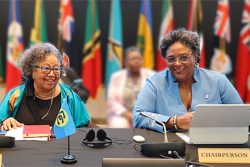 Public theatre continues to return to the Guyanese stage and there have been different types of productions in an interesting variety of venues. Among the most recent was the second play to appear in the post-COVID season at the Theatre Guild Playhouse – Nothing to Die For, an American comedy, by Michael Miller, who uses the popular sobriquet Sasha Miller. It was directed by Russel Lancaster and produced by Lancaster and Andre Wiltshire.
Public theatre continues to return to the Guyanese stage and there have been different types of productions in an interesting variety of venues. Among the most recent was the second play to appear in the post-COVID season at the Theatre Guild Playhouse – Nothing to Die For, an American comedy, by Michael Miller, who uses the popular sobriquet Sasha Miller. It was directed by Russel Lancaster and produced by Lancaster and Andre Wiltshire.
The playwright’s intention was clearly comedy, though he created a thriller, using high drama and suspense, and something akin to a parody of the play within a play. It treats a potentially funny situation in a plot with high dramatic potential; interesting, but not original.
A playwright (Mark Luke-Edwards) is suffering from writer’s block. At the same time he is in conflict with his wife (Sonia Yarde) to whom he would normally look for inspiration. But this time he can draw nothing from her because, always preoccupied with his work, he leaves her emotionally starved and neglected, and she has drifted from him, taking refuge in an affair with his friend (Andre Wiltshire), a regular visitor to the house.
He finds out about this clandestine liaison, but keeps his discovery a secret. He then plots to punish them and bring the affair to an end through a process of frightening and humiliating them, thus forcing them to confess without them ever knowing that he had found them out. He therefore pretends to be writing a play about infidelity, with a plot that almost exactly matches the real situation of his wife and friend. This, he announces to both of them, but complains that writer’s block was impeding his progress with advancing the plot.
As a playwright, he is normally in the habit of using his wife and friend as actors and collaborators to try out scenes and ideas. So he invites the friend as well as their divorced and lonely neighbour (Nuriyyih Gerrard) to dinner and tries out this new play with them. But he takes it further, because in the assumed play, the husband finds out the love affair, holds the culprits at gun-point and forces them to collaborate in their own murder. The playwright, assuming the fictitious husband’s role, arms himself with a real gun, subdues them, and pretends that he is about to kill them.
His intention is to punish them psychologically, leaving them terrified and wondering if he really knows their secret and is really going to shoot them. The playwright thrives on this, toys with them menacingly and brings them to the point of confession and pleading. He then brings the charade to an end, revealing that he was only play-acting, pretending that the episode has worked well and has given him the ideas he needs for the play, thanking them for their help and ending the very scary drama.
But the dramatist was not quite finished with his victims. He only allows them to feel that they were let off the hook by giving them a false sense of security, believing that their secret was still safe. He then chooses that moment of relaxed defences, to drop the bombshell. In the last line of the play, he catches his friend off-guard by pointedly telling him “stop sleeping with my wife”.
That was supposed to be the sharp and charged closing punch-line of a rollicking, funny play. The problem is that the play was not rollickingly funny and had only inconsistent moments of effective humour. There were many things that were awry, arising from both the writing and the staging. Luke-Edwards and Yarde set up the dramatic situation excellently. A husband shut up and preoccupied with his work, overbearingly fastidious, shuts out his wife, who, visibly starved of emotion and attention, is bored, and has an affair. Luke-Edwards and Yarde communicate the necessary subtleties to advance the action, but a number of details tended to be a bit confusing or that didn’t quite work.
Yarde and Luke-Edwards performed well as opposites, making the audience aware of an uncomfortable gulf between them. But the opposite chemical fire was totally missing from the lovers. Evidence of the wife having found sexual energy in the illicit affair was only there because they talked about it. The flatness seemed to be caused by the character of the friend as played by Wiltshire, which was totally devoid of anything resembling lust or ardour.
In plays, information or character traits are provided which can be used to assist in advancing the plot. Strangely, the friend comes over much more as an eccentric than as a lover. He converses with himself and is scared of his own shadow, recoiling in horror at every unexpected sound or movement. These traits were, perhaps, just put in for extra laughs since it is a comedy, but they did not prove useful. Wiltshire, however, adopted them throughout. He appeared uncertain – a clumsy, perpetually frightened character, tense, highly strung and odd, quite the parody of one taking improper care of a neglected wife.
There were no subtleties or nuances when changes were needed. Wiltshire could not, then, reach any emotional heights when the lovers faced naked terror and humiliation, because he was playing an uncertain, scared and nervous character from the beginning.
The function of the lonely neighbour was not immediately obvious. She was not a major protagonist in either the real or the feigned drama. Her main role may be interpreted as additional laughter, considering her character and antics. She had little dramatic complexity worthy of the superior abilities of Gerrard, who delighted the audience appropriately. This neighbour was as sexy as she was sex-starved and very much the wise choric commentator when she was drinking (which was all the time). She had much to say about infidelity and suspicion.
Gerrard avoided the stereotyped drunk and played what might well have been a foil for the lonely wife, since, when she was still married, she experienced an unfair husband, neglect and loneliness. Gerrard was equal to the task, becoming the sexy, obsessed character complete with extremely eye-catching costume and studied, amusing characteristics.
Among the other factors not so easy to follow was why the lovers, when they seriously thought they were about to be murdered, made no attempt to escape. They remained in the room, even when the threatening husband left for long periods. They did call the police, yet when sirens were heard outside they took no advantage of the belief that help was near. To go further, the marauding playwright could hear the sirens screaming outside for a long time, but they made absolutely no impression on him as he continued his play of impending slaughter. The arrival of the police made no impact whatsoever on the plot.
Luke-Edwards commanded his role, kept control of the action throughout, and was quite convincing during the whole reign of terror. He gave the impression of a schizophrenic maniac leaving both the terrified lovers and the real audience in doubt for a long time about what was real and what was feigned. He brought some suspense into the action, aided by the reactions of Yarde, who was able to convey the range of changing emotions. She, too, was credible right through the drama in a very sensitive, accomplished performance. But there were moments of confusion and uncertainty as either the script or the stage business was less than effective. This included a hazy period of conversation between the men just before the end. Matters only became clear at the final punch-line.
Nothing to Die For was played on a very realistic set, polished and detailed with real home furnishings. As announced by Lancaster, a few private companies, including a furniture store, supported the production. That was indeed encouraging. The chairs around the dining table, however, were too high and masked vision when someone was sitting at the table. But that was minor and negligible in a play that needed some editing and use of some detail as it threatened its own effectiveness with a few elements meant to enhance its comedy.










